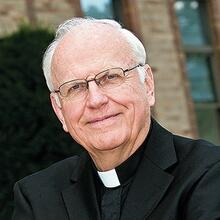Wisdom of Solomon (also known as the Book of Wisdom) offers a perspective on Luke 12. An extended essay in elegant Greek, Wisdom of Solomon was written for Egyptian Jews around the first century B.C. Like some of the literature produced in this period, it retells biblical traditions in an elaborate and often allusive style. Today’s excerpt retells Exodus 11–12, the death of the Egyptian firstborn and the sparing, through the smearing of the paschal lambs’ blood, of the Hebrews firstborn. The lectionary excerpt emphasizes two things: (1) the exodus generation, "our fathers," knew ahead of time that the divine intervention would uphold them and punish their enemies; (2) the same act would both uphold them and put down their enemies. Why? Because God’s just interventions or "judgments" establish justice, that is, to rectify the kind of injustice that the enslaved Hebrews were suffering. Trusting in the covenantal promises made to their ancestors ("the oaths"), the Hebrews waited expectantly for God’s arrival. (A couple of clarifications regarding the translation: "in secret" may refer to the Hebrews’ worshiping unbeknownst to the Egyptians; "the divine institution" refers to the ritual laws in Exodus 12-13.) Looking at Luke 12 through the lens of Wisdom of Solomon helps us understand the phrase "for your Father is pleased to give you the kingdom." The disciples can relay on God to intervene. To rely on God’s help is not easy, however. It means knowing how to wait and to remain alert until that intervention. It is all too easy for servants and those holding responsibility in the community to forget about God’s "arrival" and adopt self-regarding behavior such as mistreatment of co-workers. Hebrews 11 also underlines this future orientation of faith. Today’s English Version (TEV) of 11:1 brings out that aspect of faith: "Faith makes us sure of what we hope for and gives us proof of what we cannot see." Richard Clifford, S.J.
Wisdom of Solomon and Hebrews 11
Show Comments (
)
Comments are automatically closed two weeks after an article's initial publication. See our comments policy for more.
The latest from america
Eight decades after the end of World War II, Father George Zabelka exists as a symbol of conscience, one who can communicate the message of Gospel nonviolence.
At a Mass for the Jubilee of Youth outside Rome, Pope Leo exhorted over a million young people to be "seeds of hope" and a "sign that a different world is possible."
Perhaps it is the hard-won wisdom that comes with age, but the Catholic rituals and practices I once scorned are the same rituals and practices that now usher me into God's presence, time and time again.
"Only through patient and inclusive dialogue" can "a just and lasting conflict resolution can be achieved" in the long-running conflict between Israelis and Palestinians, said the Holy See's permanent observer to the United Nations.







